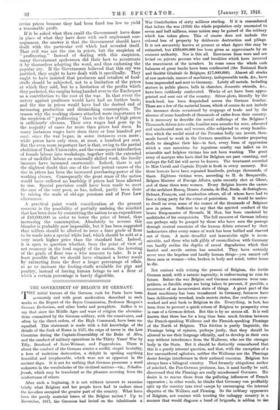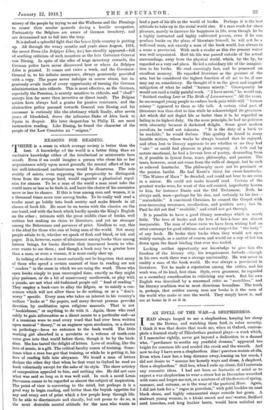THE GOVERNMENT OF BELGIUM BY GERMANY.
THE initial horrors of the German rush for Paris have been THE and with great moderation described in such works as the Report of the Bryce Commission, Professor Morgan's German Barbarism, and other books and pamphlets. Suffice it to say that since the Middle Ages and wars of religion the abomina- tions committed by the German soldiery, with the connivance, and often by the direct orders, of the High Command, have been un- equalled. This statement is made with a full knowledge of the details of the Sack of Rome in 1527, the reign of terror in the Low Countries during the Captain-Generalship of the Duke of Alva, and the conduct of military operations in the Thirty Years' War by Tilly, Bernhard of Saxe-Weimar, and Pappenheim. There is about the conduct of the German armies a sordid, stupid brutality, a love of malicious destruction, a delight in spoiling anything beautiful and irreplaceable, which were not so apparent in the ancient days. It is not for nothing that German possesses a word unknown in the vocabularies of the civilized nations—viz., Schaden- freude, which may be translated as the pleasure accruing from the misfortunes of others.
After such a beginning, it is not without interest to examine briefly what Belgium and her people have had to endure since the invaders occupied the greater part of the country. What have been the purely material losses of the Belgian nation ? Up to November, 1917, the Germans had levied on the inhabitants a War Contribution of sixty millions sterling. If it is remembered that before the war (1910) the whole population only amounted to seven and half millions, some notion may be gained of the robbery which has taken place. This of course does not include the colossal loss of property by deliberate destruction and pillage. It is not accurately known at present at what figure this may be estimated, but £320,000,000 has been given as approximate by an eminent authority. Nor is this all. Enormous fines were and are levied on private persons who and localities which have incurred the resentment of the invaders. In some oases the whole cash balances of great banks have been confiscated (the National Bank and Societe Generale de Belgique, £17,000,000). Almost all stocks of raw materials, masses of machinery, indispensable tools, &o., have been impounded and sent to Germany. Lately all metals, including statues in public places, bells in churches, domestic utensils, have been ruthlessly confiscated. Works of art have been appro- priated and sent out of the country. Silver- plate, literally by the truck-load, has been despatched across the German frontier. These are a few of the material losses, which of course do not include the immense drain occasioned by stoppage of trade and by the absence of some hundreds of thousands of exiles from their country. Is it necessary to describe the moral sufferings of the Belgians ? Thousands driven into exile, families torn asunder for ever, educated and uneducated men and women alike subjected to every humilia- tion which the sordid mind of the Prussian bully can invent, thou- sands forced to work in the German munition factories preparing shells to slaughter their kin—in fact, every form of oppression which a race notorious for ingenious cruelty can inflict on its miserable and helpless victims has not been wanting. The great army of martyrs who have died for Belgium are past counting, and perhaps the full list will never be known. The treatment accorded to Miss Cavell and Captain Fryatt is fresh in every memory. But those horrors have been repeated hundreds, perhaps thousands, of times. Eighteen victims were, according to M. de Broqueville, Belgian Minister of Foreign Affairs, quite recently shot at Ghent, and of these three were women. Every Belgian knows the names of the architect Banal, Messrs. Jacmin, de Hal, Rods, de Satteghem, Delsant, Francois, and numberless others, all of whom have had to face a firing party for the crime of patriotism. It would be useless to dwell on even some of the names of the thousands of Belgians now in prison. Sufficient to say that the spirited conduct of the brave Burgomaster of Brussels, ISE Max, has been emulated by multitudes of his compatriots. The full measure of German infamy can perhaps only be grasped by those who have seen the passage through neutral countries of the human debris returned by their taskmasters after every ounce of work has been bullied and starved out of them. A more dreadful and lamentable sight is incon- ceivable, and those who talk glibly of reconciliation with Germany can hardly realize the depths of moral degradation which that bestial and servile nation has sounded. They have certainly never seen the hopeless and hardly human things—you cannot call them men or women—who, broken in body and mind, totter home to die.
Not content with ruining the present of Belgium, the fertile German mind, with a satanic ingenuity, is endeavouring to ruin its future. Before the war Belgian and German commerce were com- petitors, so forcible steps are being taken to prevent, if possible, a recurrence of an inconvenient state of things. A great part of the finest machinery has been transferred to Germany, furnaces have been deliberately wrecked, trade secrets stolen, fine craftsmen over- worked and sent back to Belgium to die. Everything, in fact, has been done to prevent a quick return of Belgium to prosperity even in case of a German defeat. But this is by no means all. It is well known that there has for a long time been much friction between the French-speaking Walloons and the Flemish-speaking Flemings of the North of Belgium. This friction is partly linguistic, the Flemings being of opinion, perhaps justly, that they should be allowed to use their language officially, and to develop in their own way without interference from the Walloons, who are the stronger body in the State. But it should be distinctly remembered that this is a purely internal question, and that, with the exception of a few unconsidered agitators, neither the Walloons nor the Flemings desire foreign interference in their national concerns. Belgium has always been a bilingual country. That formerly ubiquitous author of mischief, the Pan-German professor, has, it need hardly be said, discovered that the Flemings are really unredeemed Germans. His desire is to rescue them from the polluting influences of French oppression ; in other words, he thinks that Germany can profitably split up the country into rival camps by encouraging the internal disputes of the Walloon and Fleming. So the military oppressors of Belgium, not content with treating the unhappy country in a manner that would disgrace a band of brigands, is addin& to the
misery of the people by trying to set the Walloons and the Flemings to renew their secular quarrels during a hostile occupation. Fortunately the Belgians are aware of German treachery, and are determined not to fall into the trap.
It is indeed a splendid fight that the brave little country is putting up. All through the weary months and years since August, 1914, the secret Press (La Belgique Libre, &o.) has steadily appeared—full of scathing criticism of such monsters as the late Governor-General von Biasing. In spite of the offer of huge monetary rewards, the German police have never discovered how or where La Belgique Libre is printed. It comes out twice a week, and the Governor- General is, to his infinite annoyance, always generously provided with a copy. The paper never indulges in coarse abuse, but in- geniously avails itself of every opportunity of turning the German administration into ridicule. This is most effective, as the German, especially the Prussian, is acutely sensitive to ridicule, and " chaff" annoys him far more than invective or direct insult. The Belgian nation have always had a genius for passive resistance, and the obstructive policy pursued towards General von Biasing and his successor is curiously like the obstinacy which finally, after seven years of bloodshed, drove the infamous Duke of Alva back to Spain in despair. His later despatches to Philip IL are most instructive reading. Like Biasing, he found the character of the people of the Low Countries an " enigma."



























 Previous page
Previous page